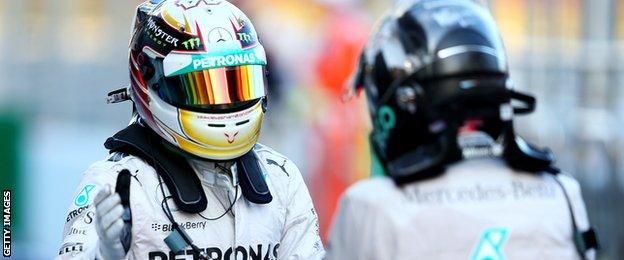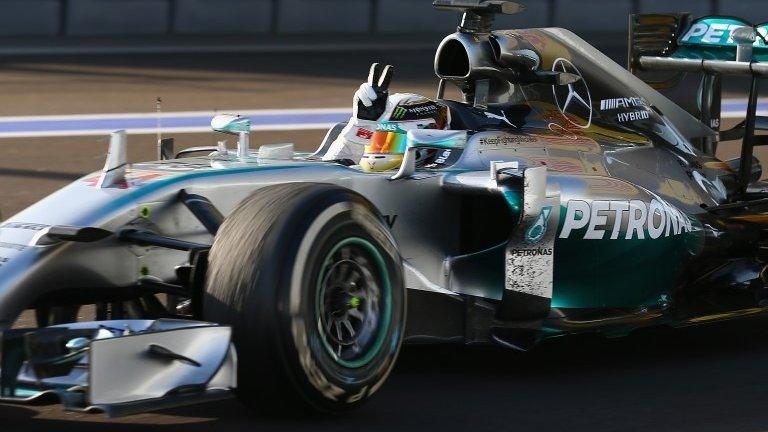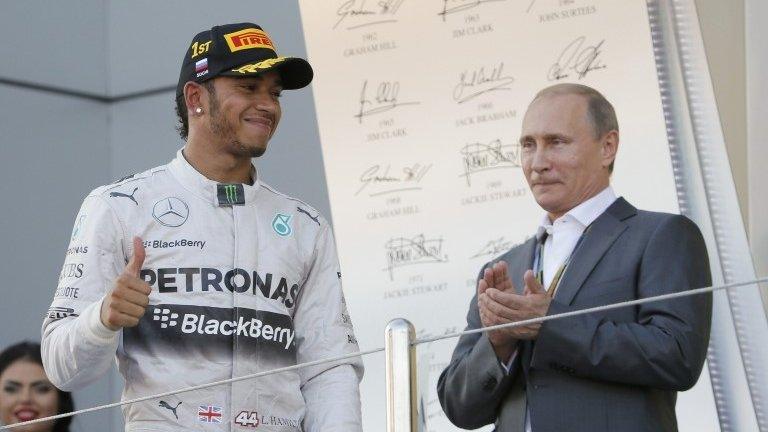Mercedes will block move to relax F1 engine development rule
- Published
Mercedes say they will block any move to relax the rule restricting in-season engine development.
Rivals of the new world champions are pushing for at least one development step during a season, in the hope of reducing Mercedes' advantage.
But Mercedes say they cannot do that and continue to provide engines to customer teams at their current cost.
Christian Horner, boss of Renault's works team Red Bull, says relaxing the rules is in the sport's interests.
Horner pointed to Mercedes driver Nico Rosberg's climb from the back of the field to finish second in Sunday's Russian Grand Prix, in which cars with Mercedes engines finished in the first five positions, as evidence something needed to be done to equalise the performance across engine manufacturers.
"Mercedes' true performance is they can drive through the field, and I think it's too out of kilter - five Mercedes-powered cars in the top five," Horner said.
This is the first season in which F1 cars are using turbo hybrid engines.
In order to keep costs under control, a complicated formula restricting development was imposed, with changes only allowed mid-season for reliability and cost-saving purposes and increasing restrictions on the parts that can be changed ahead of subsequent seasons.
Horner said: "This technology is still quite raw. Mercedes shouldn't be afraid of competition. They're doing a super job but I think it's healthy for F1 that Ferrari, Honda and Renault should have the ability to close that gap, otherwise we'll end up in a very stagnant position."
But Mercedes boss Toto Wolff said he had pointed out to his team's rivals that a relaxation of restrictions on development would not necessarily lead to an equalisation of performance between manufacturers and that it would increase costs.
"We still think it is the wrong thing to do because it is going to increase the cost massively," Wolff said. "And who says the margin is not going to stay the same?

Mercedes' Lewis Hamilton and Nico Rosberg have come first and second in nine races of 16 so far this year
"So we all spend much more to find it is the same.
"But there are certain regulatory contradictions. We were asked to guarantee engines at the time at the same spec to all customers at the same price and we can't do that if we are having in-season development."
Horner acknowledged the possibility of Mercedes maintaining or even extending their advantage if restrictions were relaxed.
"Quite possibly," he said. "But at least you've got the ability to try and improve because at the moment you're frozen with what you've got. You're running with your hands tied behind your back."
McLaren racing director Eric Boullier, whose team are starting a new partnership with Honda, added: "We all believe we will learn from our mistakes."
Horner said Wolff had initially backed the idea of a relaxation of the engine freeze at a meeting last month only to backtrack later.
Wolff said this was because of "changing circumstances" and the increased costs of such a step and he rejected claims by Ferrari that engines could continue to be provided to customer teams for no extra cost if in-season development was allowed.
"I don't know how they make their calculations but probably I need to send them a calculator because there is no way you will not spend more," Wolff said.
"You will spend considerably more and every other argument is because they don't think they are where they should be [competitively]."
To be passed for 2015, the engine 'unfreeze', as it is known, has to go through several regulatory steps.
It was passed by a majority vote in a recent meeting of F1's strategy group, which comprises commercial boss Bernie Ecclestone, the president of governing body the FIA Jean Todt and the Mercedes, Ferrari, Red Bull, McLaren, Williams and Lotus teams.
But to be in the 2015 regulations it must receive unanimous support at the next meeting of the F1 Commission, on which sit Ecclestone, Todt, and representatives of all the teams, as well as some sponsors and circuit owners.
Wolff, who is under pressure from Ecclestone to change his position, said: "We have already voted against it in the strategy group. I don't think we will change our mind in the next month, whenever the commission meeting is going to take place."
- Published13 October 2014

- Published12 October 2014

- Published12 October 2014

- Published12 October 2014

- Published26 February 2019
